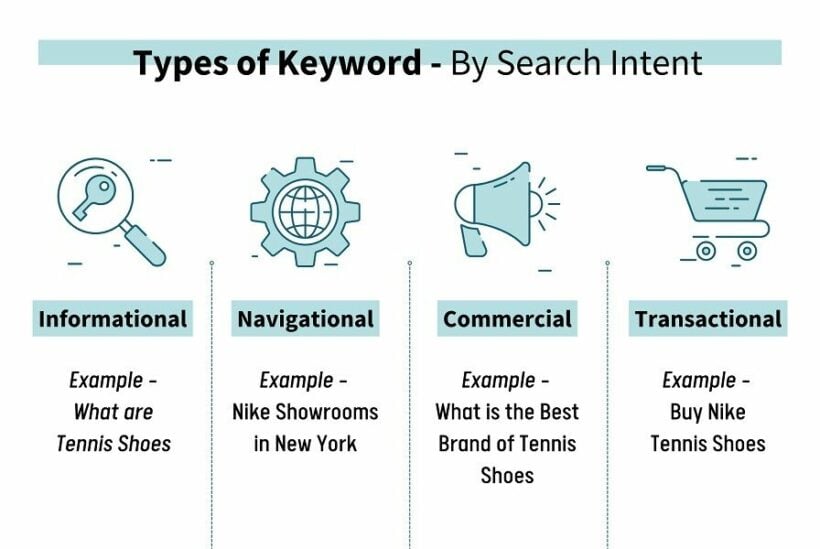SEO fundamentals: The different types of keywords

Diving into the world of SEO, it’s clear that keywords are the backbone of any successful strategy. They’re the magic words that connect your website with users’ search queries, guiding potential traffic right to your digital doorstep. Understanding the different types of keywords and their uses can significantly amplify your SEO efforts.
Whether you’re aiming to sell a product, educate your audience, or stand out among competitors, selecting the right keywords is crucial. From informational to transactional, each type serves a unique purpose in the vast landscape of search engine optimization. Let’s embark on a journey to unravel the mysteries of SEO keywords, setting the stage for a strategy that’s as robust as it is effective.
What are keywords?
When you’re diving into the world of SEO, understanding the concept of keywords becomes crucial. Essentially, keywords act as bridges, connecting your website’s content with the queries your potential audience types into search engines. They’re the critical tools that help your content gain visibility on the vast internet landscape, driving the right traffic directly to your site.
At their core, keywords are either single words or complex phrases that succinctly describe the content on your page or the services and products you offer. SEO keywords play a pivotal role in optimizing your website, ensuring it appears in search results when your target audience is looking for information, products, or services related to your business.
What are the different types of keywords?

Diving into the realm of SEO, you’ll encounter a myriad of keyword types, each serving a unique purpose in enhancing your site’s visibility and searchability. Understanding these distinctions not only sharpens your SEO strategy but also bridges the gap between your content and the audience seeking it.
1. Informational
When you’re diving into SEO, understanding the role of informational keywords is crucial. These keywords signal that you’re in search of knowledge on a specific topic. Picture yourself searching for “tips for buying a used car” – this is a classic example of an informational keyword. You’ll often see these keywords enhanced with phrases like “how to” and “what is”, indicating a quest for information.
Interestingly, informational keywords frequently appear as questions, beginning with “what”, “why”, “how”, and so on. In response to these searches, Google often showcases featured snippets, offering quick, direct answers right at the top of the search results page.
Remember, incorporating a variety of informational keywords into your content strategy helps cover more ground, ensuring you cater to a broad audience. Whether it’s through detailed blog posts, guides, or FAQs, delivering high-quality, informative content not only boosts your SEO efforts but also establishes your credibility in the field.
2. Navigational
When you delve into SEO strategies, understanding navigational keywords is pivotal. These keywords are essentially the compass users employ to steer directly towards your brand’s online presence. Imagine a user already has a notion about what they want and where to get it but needs to pinpoint your website amidst the vast digital ocean. This is where navigational keywords play a crucial role.
Navigational keywords are primarily associated with searches for a specific brand or company. You’ll often find searchers using these terms when in the consideration phase of their buying journey. Their goal? To land directly on the website of a brand they have in mind. Unlike informational keywords that seek broad knowledge, navigational queries are sharp and targeted. For instance, if someone types “Central Oregon roofing companies” into a search engine, their intent leans more towards exploring options within a particular locale, but with a brand or solution already atop their mind.
3. Commercial
When diving into the diverse world of SEO, understanding Commercial Keywords plays a critical role in crafting your strategy. These keywords, fuelled by users’ desire to delve deeper into a product or service, pivot around research and comparison. Unlike the broad, exploratory nature of informational keywords, commercial keywords step into a realm where potential buyers are considering their options.
Transactional phrases often accompany commercial intent keywords. Users wielding these terms are ready to buy, flashing clear signals with searches like “buy” or “for sale”. The transition from mere interest to purchase intent is profound, marking a pivotal moment in the customer journey. Your content needs to be optimised to harness this transition, turning curiosity into conversion.
4. Transactional
When you delve into SEO strategies, understanding transactional keywords becomes crucial. These keywords signal a high intent to take action, such as making a purchase or subscribing to a service. Unlike informational keywords that serve users looking for answers, transactional terms are for those ready to act. This category includes powerful modifiers like buy, order, purchase, discount, and coupon. Here are some examples:
- Buy vinyl records
- Order lab tests online
- Purchase Kindle books
- Outdoor toys discount
- Movie tickets coupons
Including transactional keywords in your content, especially on landing pages and product descriptions, can notably boost your conversion rates. Typically, users searching with these terms have already researched and decided, making them more likely to convert.
3 types of keywords by length
When diving into the world of SEO, understanding the diversity of keywords based on their length is crucial for crafting a strategy that meets your audience right where they are in their search journey. Keywords can generally be categorized into short-tail, mid-tail, and long-tail. Each category plays a unique role in SEO, influencing both the volume and specifics of the traffic directed to your website.
Short-Tail Keywords
Short-tail keywords typically encompass one to three words. These keywords are broad and often carry a high search volume, making them extremely competitive in the SEO landscape. If you’re just stepping into SEO, it’s vital to recognize that while ranking high for short-tail keywords is rewarding due to their traffic volume, achieving this feat is no small undertaking. For instance, a term like “fitness equipment” falls into this category; it’s broad enough to attract a vast audience but competitive enough to make ranking a challenge.
Mid-Tail Keywords
Mid-tail keywords, which usually range from three to four words, strike a balance between the breadth of short-tail keywords and the specificity of long-tail keywords. They still command a significant search volume but bring a bit more context and specificity to the table. Phrases such as “home fitness equipment” offer a glimpse into the kind of targeted traffic mid-tail keywords can generate. These terms are somewhat easier to rank for than their short-tail counterparts and can lead to more qualified traffic, a golden middle path for many SEO strategists.
Long-Tail Keywords
Diving deeper into specificity, Long-tail keywords typically consist of four or more words. They are highly detailed and often signal a user’s intent to engage or purchase. Despite their lower search volume compared to short and mid-tail keywords, long-tail keywords hold immense value for SEO because they attract highly targeted traffic with a clearer intent. For example, “affordable home fitness equipment for beginners” is a long-tail keyword that not only describes what the user is searching for but also their intended use and price sensitivity. Incorporating long-tail keywords into your content can significantly enhance your ability to connect with your target audience and drive meaningful engagement.
3 types of keywords by role
When delving into the multifaceted world of SEO, understanding the specific roles that different types of keywords play can significantly enhance your strategy. Each category serves a distinct purpose in bridging the gap between user queries and your content. Here’s a clearer view of how these categories function.
Focus Keywords
At the heart of any SEO campaign lies your focus keyword. This is the linchpin around which you craft your content, ensuring it resonates with your target audience and search engines alike. It’s what you hope your page will be known for, appearing prominently in the URL, title, body, and at least one heading. Selecting a robust focus keyword requires thorough research and a keen understanding of your target audience’s search habits.
Secondary Keywords
Expanding upon your core idea, secondary keywords let you broaden your outreach and cater to a wider segment of your audience. They’re the variations and adjacent topics that enrich your content, making it more discoverable. Incorporating secondary keywords naturally into your content ensures a richer, more versatile page that addresses a variety of related queries. For example, if your focus keyword is “home workouts,” secondary keywords might include “home exercise routines” or “at-home fitness tips.”
Semantic Keywords
Semantic keywords delve deeper into the context and relevance of your content. They’re not just about matching specific terms; they involve understanding the intent and varied expressions of your audience’s searches. Integrating semantic keywords means your content is not only tailored to exact match queries but also resonates with the underlying topics and themes your audience is interested in. This enriches your content’s relevance and boosts its visibility across a broader spectrum of search queries.
Remember, successful SEO isn’t just about singling out individual keywords but creating a cohesive strategy that leverages various types to connect genuinely with your audience and meet their search needs effectively.
Choose the right SEO keyword for your SEO strategy
Crafting your SEO strategy starts with pinpointing the ideal keywords. These are not just any words; they’re the bridge that connects you to your target audience when they’re hunting for what you offer. Understandably, the process might seem daunting, but it’s crucial for ensuring your content doesn’t just attract viewers but the right kind of viewers.
Seeking a content marketing plan? Explore our article on 2024 Content Marketing Strategy Trends.
Latest Thailand News
Follow The Thaiger on Google News:


























